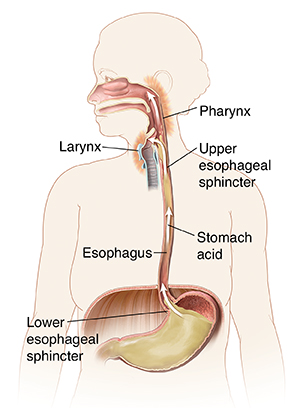Do you have to clear your throat or cough often? Are you hoarse? Do you have trouble swallowing, or have heartburn, or pain in your throat? If you have these or other throat symptoms, you may have acid reflux. This occurs when stomach acid flows back up and irritates your throat.
Why you have throat symptoms
There are muscles (esophageal sphincters) at both ends of the tube that carries food to your stomach (the esophagus). These muscles relax to let food pass. Then they tighten to keep stomach acid down. When the lower esophageal sphincter (LES) doesn’t tighten enough, acid can flow back (reflux) from your stomach into your esophagus. This may cause heartburn. In some cases, the upper esophageal sphincter (UES) also doesn’t work well. Then acid can travel higher and enter your throat (pharynx). In many cases, this causes throat symptoms.
Common throat symptoms
-
Need to clear your throat often
-
Feeling like you’re choking
-
Long-term (chronic) cough
-
Hoarseness
-
Trouble swallowing
-
Feel like you have a lump in your throat
-
Sour or acid taste
-
Sore throat that keeps coming back


